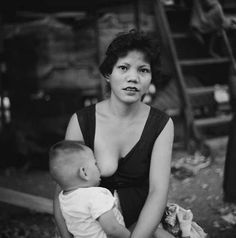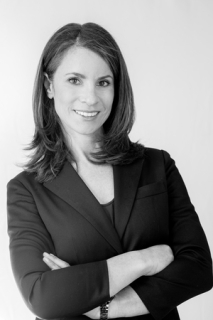Randi Zuckerberg's Blog, page 20
March 30, 2016
Radio Recap: Women Who Code

Researchers from Cal-Poly and North Carolina University recently found that the open-source programming women provided on code repository, GitHub, was rated higher than then their male counterparts, yet was often rejected due to gender bias. And last week job specialist, Glassdoor, announced that men computer programmers still make almost 29% more than women coders. But instead of giving up, more ladies are learning programming thanks to groups like Women Who Code, founded in 2011, whose number of lady coders has grown to exceed over 12,000 members in 14 different countries. Known for its technical study groups, hack nights, and speaking events featuring influential technology industry experts and investors, Women Who Code also teaches career development, getting ready for those 1.4 million technology jobs that will all need to be filled by 2020.
Today on ‘Dot Complicated with Randi Zuckerberg’ Randi sat down with Women Who Code NYC Co-Founder, Elizabeth Ferrao, and Alicia Carr, a self-taught coder who created a domestic violence app and runs the WWC chapter in Atlanta:
“This week’s ‘The Good Wife’ was just all about drones and security.”
“65% of toddlers will have jobs that don’t exist right now.”
“3D printing gives you the things you need for a fraction of the cost.”
“Everyone on the internet has an inner troll in them.”
“Coder Dojo has been the way I’ve roped in my brother. It’s a once a month exploration of different software.”
“I attended a magnet high school, I thought I was going to be a mechanical engineer. I started at Google being taught to how to code.”
“Coding is a way to create ideas and test them out to see if they work.”
“I spent a summer in SF and was going to Women Who Code Meetups. They were free and gave me a sense of community and social structure.”
“My co-founder Stella works on the details while I work on the big picture.”
“Keeping in touch with everyone and hosting everything is all on a volunteer basis.”
“There’s a variety of events we host. Lightning Talks are 5-10 minutes about something we’re working on.”
“People who haven’t heard about a certain script or bootcamp are exposed to accessibility resources through our WWC talks.”
“One of the best panels we had was how to be a mother in the tech industry. We talk about the problems we’re facing.”
“My friend was talking about her sorority in college and could describe people in such detail. There’s such active promotion.”
“I would like to say there’s a lot of opening for Jr. Devs who invested money in their career and see the returns. A lot of the companies are looking for Sr. Devs.”
“Build something, don’t spend your time looking for a job.”
“There’s so much interest from women. The pipeline problem is something being actively worked on in WWC.”
“There’s so much potential for women who code.”
—
“I don’t think Microsoft tested Tay properly. That’s why it failed.”
“I have 8 grandbabies, 3 of them wanted to learn to code. I directed them to Scratch. It’s online coding to know if you’re really interested in it.”
“Girls Who Code is huge. Find a local chapter near you. 100 Girls of Code is another.”
“My husband was in the military so I took college courses for DOS classes. I got hired as a database programmer. I fell in love it.”
“In high school was the first time I ever touched programming: The IBM touchcards.”
“I was standing in line getting an iPad and a 16-year-old was in front of me getting one. No 16-year-old has $800 to buy an iPad. He earned by learning to code on YouTube.”
“I found the Atlanta Developers Group. I got a mentor, he helped me build my confidence.”
“PEVO gives women the necessary info to get out of their situation. It gives them the law and plans their exit strategy.”
“PEVO took two months to build. But took longer to get through Apple.”
“Women Who Code was started in 2013, I came in at 2014. I was having several problems with my app. It wasn’t passing the submittal process.”
“For Apple you have to resize storyboards to fit to the phone size.”
“We taught women on getting Github. We’re working on making better profiles on LinkedIn. I help women learn iOS development.”
“My husband taught me that the main focus of passion should be in my LinkedIn.”
“I was a Zumba instructor, I’m an amateur photographer—I put those on LinkedIn. People get to see who you are.”
“When I was looking for someone to help me become a mobile developer it was different than asking men.”
“I’m trying to make PEVO national. It’s become a challenge because I’m a woman.”
“WWC has a newsletter with companies looking for women for job opportunities. But right now it’s very slow for women.”
“I built an app thinking I could get a job. Now that I built the app, they aren’t interested. They say they want to diversify, but there’s still a lot of change that has to happen.”
“I have pitched to one investor, he referred me to another investor. Where I wanted to be in a year is not going to happen.”
“It’s hard to be a woman entrepreneur nowadays.”
“I’m a black, 53-year-old woman. I have three strikes against me.”
“I’m working on the national app. I hope to be done in a few weeks.”
PEVO.us & Women Who Code Atlanta
Join Dot Complicated with Randi Zuckerberg’ next Wednesday, April 6th when the founder of Laan Labs , creators of Face Swap Live, sit down to discuss creating apps. Only on SiriusXM Business Channel 111 at 12pm ET/9am PT.
March 24, 2016
Women’s History Month: Razia Sultan

Razia Sultan is the only woman ever to be crowned the Sultan of Delhi. After the death of Razia’s father, her brother was crowned sultan but was killed less than seven months on the throne. From 1236 to 1240, Razia’s reign, while noble and forward-thinking, did not sit well with Muslim nobles who disliked being under a female ruler.
Her rise to power is doubly notable not only because of her gender, but because her ancestors were not nobility, they were slaves. Her father, Iltutmish, had risen in ranks through support of the Turkish nobility and became the sultan. Iltutmish, was just a legendary for being the first sultan to appoint a woman as successor—his daughter Razia.
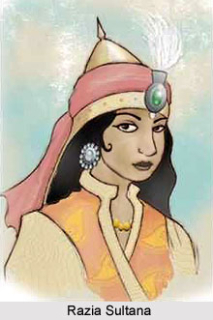
Throughout his life, Iltutmish made sure Razia had military training and was educated properly. Though her rule lasted less than 4 years, while in power Razia proved to be loyal, noble, and just. As sultan, Razia dropped her veil and wore masculine clothing. She led her armies proudly from the front. She was respected by her subjects, devoted to her empire, and loved by its people.
 But it was jealousy that brought Razia down. Turkish nobles planned a revolt including her childhood lover. Razia was kidnapped and held captive. Allowing her younger brother to usurp the throne.
But it was jealousy that brought Razia down. Turkish nobles planned a revolt including her childhood lover. Razia was kidnapped and held captive. Allowing her younger brother to usurp the throne.
As sultan, Razia ordered coins to be minted to read, “Pillar of women, Queen of the times, Sultana Razia, daughter of Shamsuddin Altumish”.
A builder of schools and libraries, Razia Sultan was also early STEM supporter, allowing for books on sciences to be widely read and enjoyed.
March 23, 2016
Radio Recap: Propelling Business Forward

You’ve started your own business, built a website—maybe even created an app. You’ve used social media, friends and relatives, neighbors and acquaintances all to help spread the word. Maybe you’ve hired an employee, maybe a bunch. You’ve got a lawyer, an accountant, but the one thing you don’t have is a profit.
Today on ‘Dot Complicated with Randi Zuckerberg’ Whitney Keyes, author and Member of the National Women’s Business Council, and Ritu Narayan, the CEO of on-demand childcare company ZUM discussed how to propel business forward:

“There’s so much focus on women bringing kids to work. I love seeing a man in a powerful position standing up for his family.”
“Women need to ‘lean into’ the child care space by helping it grow.”
“Businesses are in the business of making money and they need to do it in a more responsible way.”
“Passion for me has ebbed and flowed.”
“My first job was to be out in the community and help small business stay in business.”
“I had a fantastic female employer who taught me how to be passionate in government and business.”
“About 10 years ago I left Microsoft and starting exploring helping minorities in business—women, youth, people of color.”
“I was working on big, important projects but I felt there was no challenge to working to working in a major corporation.”
“I like a little bit of a challenge.”
“I read a great book called, ‘Now Discover Your Strengths.’ I wasn’t using my core strengths.”
“Propel was my company tied to my book. I saw a lot of common mistakes being made where time, money and resources were being wasted.”
“People called me ‘Miss Robin Hood’ because I took business ideas from big corporations and gave them to small business.”
“The National Women’s Business Council shows growth and development trends.”
“10 million women own businesses. 91% of women owned businesses have no employees.”
“Even when I worked in corporate America I worked in entrepreneurial pockets.”
“A lot of research is out there on how women and men do social networking. Even face to face networking.”
“It’s important to focus on quality over quantity. Women are good at going out and meeting people, but what they need are connections.”
“Women are not very good at cultivating diverse partners, which means even gender. Women sometimes need men to be powerful allies.”
“Women are not very good at continuing to build ongoing relationships. We can’t just stop.”
“NWBC created a free social networking toolkit to help identify and fix gaps.”
“The first thing I focus on is strategy.”
“As you grow, get clear on your story and your message.”
“Sometimes as we grow we get too busy to manage our story. Cultivate your message on social media.”
“The ability to propel business also comes from additional funding.”
“The Small Business Association has hundreds of resources for women small business owners.”

“I love the combination of old technology versus new tech.”
“Before I started Zum I was working with Oracle, Yahoo, and eBay. I gravitated toward new projects.”
“You can make an impact if you have the infrastructure of a big company. They provide intra-preneurial opportunities inside the company.”
“My daughter was transitioning to school, my son was already in school. I needed a trust-worthy nanny to take them to school and various activities. It impacts your career.”
“If we have an online marketplace for products, why can’t we have one that is for trustworthy child care.”
“We have iOS and Android apps which give parents a Family Assistant.
“We vet all of our drivers and do background checks.”
“Parents need consistent help, not random people at different times, so we have a small pool of drivers that each family receives.”
“Parents can track their child’s ride, alert teachers.”
“Trust is the number one concern. It is our underlying theme for Zum.”
“Growth has been primarily through word of mouth from parents.”
“The service is local in nature, so you have to balance the drivers and parents.”
“We have identified 16 different cities we’d like to grow in. Our plan is definitely to expand.”
“We are using digital media and social media to gather the demand.”
“7% of total venture funding goes to women businesses. The numbers are not at an advantage.”
“Initially our thoughts were increase the number then go for funding.”
“Have the confidence to raise the funding in various stages.”
“Communicate your vision clearly to funders. It’s very important.”
“I took whatever skills I had in financial modeling and got a lot of help.”
“Whatever skills you don’t have, partner with others who do to create a solid pitch.”
“It is harder for women—especially if you’re starting a business that can relate to women—to get funding.”
“Just go for it. You have an itch about a problem, if you don’t solve it the problem won’t be solved.”
“If you passionately get up every day about your cause, passionate people will join you.”
Join ‘Dot Complicated with Randi Zuckerberg’ as she rounds out Women’s History Month with Alicia Carr of Purple Evolution and Elizabeth Ferrao, co-founder of Women Who Code NYC. Wednesday, March 30th at 12pm ET only on SiriusXM Business Channel 111.
March 18, 2016
Women’s History Month: 104-Year-Old Guerilla Knitter Grace Brett
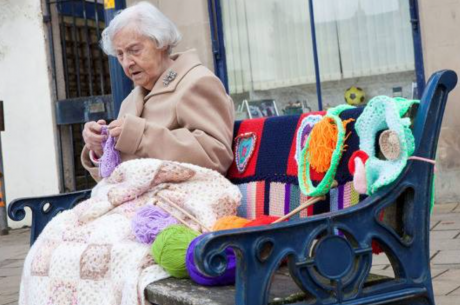
Take that Banksy! 104-year-old great-grandmother Grace Brett just may be the oldest living street artist having “yarn bombed” various benches, phone booths, walls, and other landmarks in her town in the Scottish county of Borders.
Born in London in 1910, and having worked as a telephone operator, before moving to Scotland in 1978, Grace Brett has now inspired a new generation of guerilla knitters known as the Souter Stormers. This secretive group of ‘yarnstormers’ of various-aged knitters use their knitting skills to “transform the Selkirk landscape,” said Kay Ross, a spokeswoman for the Souter Stormers group.

The group yarn-bombed the towns of Selkirk, Ettrickbridge, and Yarrow in Scotland, all as part of the towns’ festivals. Yet if they have grievances in the town, they take up their issues using yarn.
The Stormers decorated a statue of Sir Walter Scott, as well as an iconic red phone box.
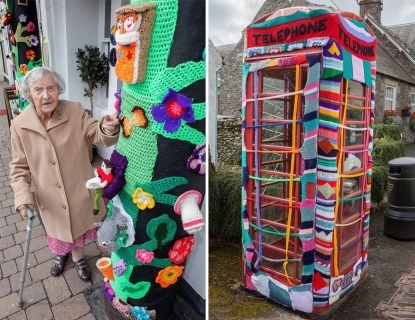 Grace told Press and Journal, “I thought it was a really good idea to decorate the town and enjoyed having my crochet included,” “I liked seeing my work showing with everyone else and thought the town looked lovely.”
Grace told Press and Journal, “I thought it was a really good idea to decorate the town and enjoyed having my crochet included,” “I liked seeing my work showing with everyone else and thought the town looked lovely.”
Grace’s daughter Daphne, 74, said, “she has always knitted and crocheted all through her life. She has always done all the knitting for the babies and made shawls.”
Brett has six grandchildren and 14 great-grandchildren and is still knitting today.

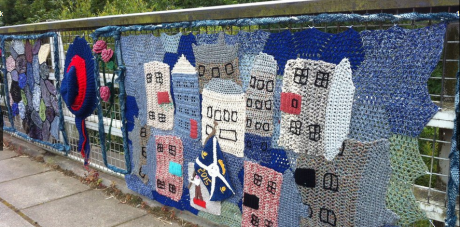
March 16, 2016
Radio Recap: Presenting Your Best Self at Work
 A few weeks ago I had Tamara McCleary on the show and her thoughts on achieving an ideal work / life balance have stuck with me ever since. In her RelationSHIFT courses, Tamara teaches to love your family through your work, instead of working hard so you can better love your family. RelationSHIFT also teaches that if we want to find our true passion, we have to put passion into the work we have now. So whether you’re in the dream job or not, you can still honor your life inside whatever office you work in through your energy, inspiration, and creativity on a day-to-day basis.
A few weeks ago I had Tamara McCleary on the show and her thoughts on achieving an ideal work / life balance have stuck with me ever since. In her RelationSHIFT courses, Tamara teaches to love your family through your work, instead of working hard so you can better love your family. RelationSHIFT also teaches that if we want to find our true passion, we have to put passion into the work we have now. So whether you’re in the dream job or not, you can still honor your life inside whatever office you work in through your energy, inspiration, and creativity on a day-to-day basis.
Discussing how to bring your best self to work everyday on ‘Dot Complicated with Randi Zuckerberg’ was Erica Keswin, founder of O.P.R. Consulting, and Genevieve Pitturo, the founder of the Pajama Program. Here’s their thoughts:
“Pajama Program celebrates its 15th year and it all started without a plan.”
“I wanted to be a single woman in the corporate world. I thought I had everything I wanted. I was shocked when something inside me said I missed something.”
“I thought I could integrate children into my life so I volunteered reading to children in shelters.”
“One night I watched where the staff was taking the kids to sleep. There were no stories, no pajamas.”
“While I was giving out pjs, this little girl asked me, “What are they?” She didn’t know what pajamas were.”
“I am big fan of writing letters, notes, and cards. I love getting mail.”
“It took us 13 years to reach 2 million people. Our wait list grew and grew. We knew we had to make something happen.”
“We set a goal to bring 1 million pajamas and 1 million books to kids and we just met it!”
“We developed the Bill of Goodnight Rights for what kids deserve at night.”
“It’s okay if you’re afraid, it’s not a reason not to ask for something.”
“Make sure there’s some common ground when sussing out investors. It’s relationship building.”
“You want people with you who want the same goal.”
“The combined moment of the little girl who refused to take the pjs and asking what they were to the next day at my job and making a mess. I couldn’t write. I knew I needed change.”
“I physically and emotionally knew that my job was wrong.”
“So many people are looking for their purpose. I was 38 and still struggling.”
“You have to recognize it and do something when you know something is missing in your life. You can’t gloss over it.”
“My husband teaches meditation so it was easy for him to tell me about it, but hard to do.”
“Ask to find what you’re supposed to do. Things pop into your mind when you’re quiet.”
“When you put aside time to quiet your mind you will find yourself in a new place.”
“I try to find a way to take a day off.”
“There’s pros and cons of trying to reach different people.”
“For women, tampons are not a luxury item. It’s not in the same category as Rogaine.”
“When it comes to technology we have to have the desire and discipline to let it go for awhile.”
“I’ve worked in consulting, helping companies improve their performance through their people.”
“The biggest question is how do we manage technology in the workplace?”
“Never Caught Up is geared to women. They are saying there’s no more work/life balance, it’s integration.”
“We’re never going to be caught up. We need to come up with prescriptions to manage time, relationships, yourself.”
“As women, at different parts at different times in our life we want to lean in or lean out.”
“I loved working but I wanted to find a job where I could disconnect at different times.”
“What makes me feel hopeful is the many different mediums to communicate. The flexibility matches the medium to the message.”
“Email might be the best way to communicate given a certain situation. But not always.”
“I realized I could take my interest in tech and use it to help improve conversation.”
“I’m so happy I’m doing something that I’m passionate about.”
“There’s a whole group of companies telling their employees that at night they’re shutting down their servers. Go home. Be with your family.”
“A woman at a company told us that when she gets home she’s with her kids. She’s not checking her phone.”
“It has to be a human that’s putting on the tech limits.”
“I tell my kids if they’re multitasking and not creating a space to work. They’re degrading their work.”
“There was a study done with 19,000 people, only 30% of managers were modeling sustainable work practices.”
“A high-profile exec had an out-of-office email set up saying she was at her child’s apple picking party. It gave women permission to follow suit.”
“Data shows women and men start off at equal places. Women drop off when they want increased flexibility.”
“If you want a diverse workforce you can’t have one way of working.”
“We need to agree that women will never fully be caught up.”
“We get inundated with emails when we’re away. Find strategies to manage your time.”
“Relationships are so important to women. Chemicals are released when we hang out together.”
“It’s important for parents to let this kids use their technology so they know how it works.”
March 11, 2016
Women’s History Month: Nangeli, Who Opposed the Breast Tax

Nangeli lived in the early 19th century in Travancore, India and who belonged to a lower cast family that could not afford to pay their township’s taxes—particularly that of the mulakkaram (breast tax) system which existed during that time. The mulakkaram required women of lower caste system to PAY A TAX TO COVER THEIR BREASTS IN PUBLIC. She refused to uncover herself and pay the breast tax.
Nangeli outright refused to uncover her bosom when demanded of her. When the village officer came to collect dues, Nangeli bravely cut off her breasts, presenting them in a banana leaf. Nangeli dies that same day due to blood loss but her actions spread quickly across the country.
In further protest, Nangeli’s husband jumped into her pyre, committing suicide—the first recorded instance of a man committing sati instead of a woman.
The crown ultimately annulled the breast tax in Travancore as a result of Nangeli’s self-mulation and defiance. In her honor, Travancore where she lived came to be known as Mulachiparambu (meaning Land of the Breasted Woman).
Reportedly Angelina Jolie is in talks to play Nangeli in an upcoming film.
Today remember Nangeli for standing up against discrimination, gender bias, and the overt sexualization of women. Spread her story, tell her tale, and fight against the laws that discriminate.
March 9, 2016
Radio Recap : Managing Money with Nicole Lapin
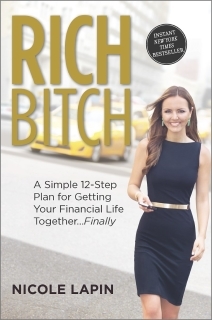 Now is that time of year when we reflect upon all our past mistakes—no, not Easter. Tax Time and it’s coming up quick, with only a little more than a month to get your finances in order before the April 15 deadline. It’s long been said that the two biggest mistakes in filing incorrect and late taxes can be attributed to poor organization and not asking for quality help. So I thought who better to ask for quality help than my favorite financial expert, author of ‘Rich Bitch’, and host of “Hatched” on the CW, Nicole Lapin. Today on ‘Dot Complicated with Randi Zuckerberg’ Nicole and Randi talked savings, money for Millennials, investments, taxes and how to run your life like a business to better invest in your dreams.
Now is that time of year when we reflect upon all our past mistakes—no, not Easter. Tax Time and it’s coming up quick, with only a little more than a month to get your finances in order before the April 15 deadline. It’s long been said that the two biggest mistakes in filing incorrect and late taxes can be attributed to poor organization and not asking for quality help. So I thought who better to ask for quality help than my favorite financial expert, author of ‘Rich Bitch’, and host of “Hatched” on the CW, Nicole Lapin. Today on ‘Dot Complicated with Randi Zuckerberg’ Nicole and Randi talked savings, money for Millennials, investments, taxes and how to run your life like a business to better invest in your dreams.
“Being a Rich Bitch is living a full life in every sense of the word. Including both friendships and career.”
“Everything does not need to be WiFi enabled.”
“I was at CNN, I went to CNBC and then Bloomberg. I realized I was reaching 40,000 people in the big scheme of things. They were all guys though.”
“We don’t learn how to budget in school. We should learn how to get out of debt and how to do our taxes.”
“The most intimidating thing is speaking the language. I wanted to create a Rosetta Stone so people can speak money.”
“I did a study when the book launched about how women would rather talk about their weight rather than their salary.”
“Money touches all aspects of our lives, it can become really scary.”
“I like to put a lot of candy over the spinach and give a sneak attack of how to manage your finances.”
“My first job paid me $20,000. I worked my way up.”
“There were two offers I got, one was with a female boss and so I decided to go with her for less money.”
“A man who had less responsibility than me was making more than me. Business is not a sorority.”
“Women don’t know what to ask for. An overall compensation package is more valuable than a base salary.”
“If you have debt, you want to disclose that in your personal relationship.”
“Women have bigger breakers in dating than finances.”
“If you’re moving in together or co-mingling, you need to know how much your partner makes.”
“Yours, mine, and ours. Ours account should be a percentage of your income, not a weighted amount.”
“I’m a big fan of secret accounts for women. Always take care of your finances in case.”
“When you’re newlyweds you need to discuss having a will. You need it.”
“You need to think about what could happen if something happens.”
“If I won the lottery I would be doing the exact same thing.”
“I got myself out of $5000 of debt the hard way. You never forget that situation.”
“I am considered a Millennial. I just want to be the best person in general.”
“Characteristics of being a woman you can use to your advantage: Being yourself is important but having a maternal aspect is business is better.”
“Not over-compensating is super important. Own your values.”
“All major decisions of your career happen when you’re not there. What are the 3 adjectives you want people to think of you?”
“I thought I needed to network on the golf course with guys. I hated golf. I joined the Taste of Atlanta and created relationships that way.”
“I am a columnist for Redbook as well and I did a bootcamp called New Year, New You. Digestible advice for a spending plan.”
“I liken financial plans to dieting.”
“It’s important to become the CEO of you.”
“Organizing your spending, side hustle a little more.”
“Women go through many stages. At some point you work for a boss, you work for yourself, you’re the CEO of your family.”

“Come up with a 1, 3, 5, 7, 10 year plan for your career and financial career.”
“You need to plan for marriage the same way you plan for your career.”
“I think women who create narratives for themselves are more successful.”
“Say, ‘here’s what I want to do in 5 years.’ You’re saving for the future.”
“Things are above board. Create a budget. You’re sneaking anything if you plan it.”
“If you can afford a really good accountant, they can save your life.”
“CPAs are not the most fun humans but they are a huge investment in your life.”
“Accountants are like a good gym trainer, they keep you accountable.”
“Telling your financial planner what your goals are will help you immensely.”
“Day 1. Uncrinkle your receipts. Taxes are overwhelming. Day 2. put the receipts in little stacks.”
“Entrepreneurialism is the winner of the recession.”
“There’s a different between hustling to make money and following your passion.”“We’re in a new normal and that’s my mission: To democratize finances.”
“Rich Bitch is a 12-step program and the Step 1 is admitting the problem is real.”
“Parents are giving their kids the book to get their finances in order.”
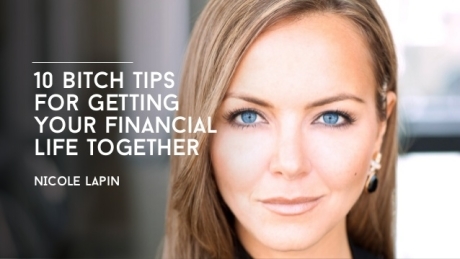 “I just froze my eggs. It was a super emotional process. I’m glad to hear other people talk about having healthy children openly.”
“I just froze my eggs. It was a super emotional process. I’m glad to hear other people talk about having healthy children openly.”
“Freezing eggs is so expensive that I almost wish I could do dishes at Google and have them pay the 12 grand for me.”
“I thought this would be a book for younger people but it spans generation.”
“Women don’t talk about money when we’re out to dinner.”
“Talking about what we make can be more empowerment to get what we deserve.”
“Boss Bitch is becoming the boss of your own life.”
“I wrote a financial dictionary in the back of Rich Bitch.”
“There’s a lot of guys on Instagram that read Rich Bitch.”
Join ‘Dot Complicated with Randi Zuckerberg’ next Wednesday, March 16th when Erica Keswin joins the show to discuss business relationships for women. Only on SiriusXM Business Channel 111 at 12 ET/9 am.
March 8, 2016
International Women’s Day: Malala Yousafzai
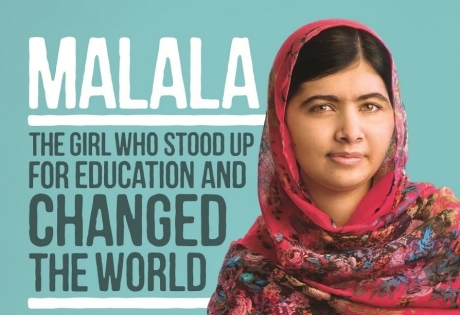 March 8th marks International Women’s Day, a day dedicated to the appreciation to women and their achievements— complete with an inspiring Google doodle!
March 8th marks International Women’s Day, a day dedicated to the appreciation to women and their achievements— complete with an inspiring Google doodle!
Today we celebrate a woman who has changed the world with her relentless courage and pursuit of girl’s education.
Born on July 12, 1997, Malala Yousafzai was raised in Mingora, a town in the Swat District of north-west Pakistan. She was named after Malalai, a Pashtun heroine. Malala’s father, Ziauddin, ran a school in Swat near the family’s home. Pakistan has the second highest number of out of school children in the world and Ziauddin, with his love for learning, became an outspoken opponent of Taliban efforts to stop girls from going to school.

Malala shared her father’s passion for learning yet the Taliban’s presence in Swat intensified. Malala feared that her school would soon be attacked and began writing a blog for the BBC under a pseudonym. Women were prevented from going shopping, all media was forbidden, and Ziauddin was told to close his school.
Continuing to speak out for education rights, death threats were sent to Malala and her father. Malala was featured in a documentary made for The New York Times which exposed her as the author of the BBC blogs. In 2011, Malala was awarded Pakistan’s First National Youth Peace Prize and was nominated by Desmond Tutu for the International Children’s Peace Prize. But her recognition grew, so did Taliban anger’s towards her. They plotted to kill her.
On October 9, 2012, a gunman boarded Malala’s school bus, asking for her by name. He shot her in the head, which also went through her neck and shoulder. Malala survived but was in a critical condition. She was moved to UK for and not discharged until January 2013, where her family met her.

Protests erupted across Pakistan. Over 2 million people signed a right to education petition, and the National Assembly passed Pakistan’s first-ever Right To Free and Compulsory Education Bill. Now a global advocate for the millions of girls denied education, Malala and Ziauddin co-founded the Malala Fund which “brings awareness to the social and economic impact of girls’ education and to empower girls to raise their voices, to unlock their potential and to demand change.”
On December 10, 2014, Malala won the Nobel Peace Prize using her $1 million prize money to finance a school for girls in Pakistan. Which is why today—and everyday—we celebrate Malala Yousafzai on International Women’s Day.
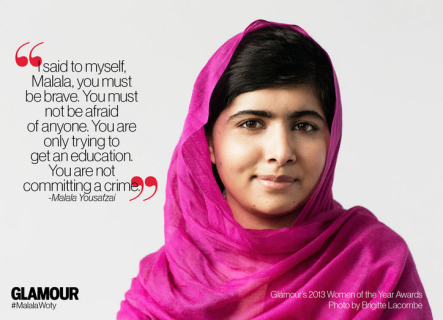
March 4, 2016
Women’s History Month: Lavinia Williams
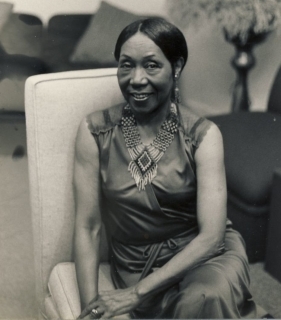 Before Misty Copeland was the first Black woman appointed as Principal into the American Ballet Theater, Lavinia Williams was a part of the American Negro Ballet, focusing on classical ballet, folk, modern, and Caribbean dance, which she mastered and taught in several Caribbean countries.
Before Misty Copeland was the first Black woman appointed as Principal into the American Ballet Theater, Lavinia Williams was a part of the American Negro Ballet, focusing on classical ballet, folk, modern, and Caribbean dance, which she mastered and taught in several Caribbean countries.
Born in Philadelphia, Lavinia began dance at the age of 3. Her family relocated to Portsmouth, VA, in 1920, where she studied ballet throughout high school. Lavinia moved to New York after she won a scholarship to the Art Students’ League in 1935.
In order to afford to buy her art supplies, Lavinia became a dance teacher at the Urban League in Brooklyn. One of the models at the school was a dancer with Eugene Von Grona’s American Negro Ballet. Lavinia attended rehearsals to sketch the dancers and shortly after Van Grona invited her to audition, accepting her into the company. Williams danced with the American Negro Ballet for three years in the late 1930s. The company disbanded in 1940, she danced for one season with Agnes de Mille’s American Ballet Theatre, appearing in the debut of de Mille’s “Obeah!” (“Black Ritual”).
 Legendary American dancer and choreographer, Katherine Dunham, saw Lavinia perform with the and asked her to join the Dunham company, where Williams remained from 1940 through 1945 as a dancer and instructor. In her work with the Dunham company, Lavinia discovered an interest in Caribbean dance that she nurtured throughout her life, dancing numerous solos such as “Rites de Passage” and “Bolero,” as well as the broadway musical “Cabin in the Sky” (1940) and films such as “Stormy Weather” (1943).
Legendary American dancer and choreographer, Katherine Dunham, saw Lavinia perform with the and asked her to join the Dunham company, where Williams remained from 1940 through 1945 as a dancer and instructor. In her work with the Dunham company, Lavinia discovered an interest in Caribbean dance that she nurtured throughout her life, dancing numerous solos such as “Rites de Passage” and “Bolero,” as well as the broadway musical “Cabin in the Sky” (1940) and films such as “Stormy Weather” (1943).
Considered a leader in teaching Haitian dance. Lavinia founded the Haitian Institute of Folklore and Classic Dance in 1954.
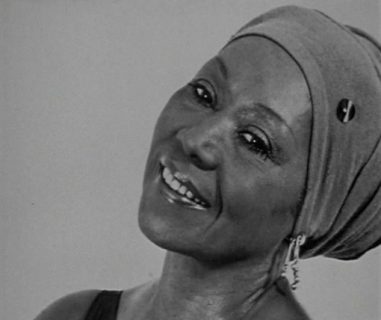 Lavinia met her first husband, Russian-born scientist Léon Theremin, after he created a floor that changed pitch and tone when danced upon. Finding no success from ballet schools around New York with a woman who could “play” it, Leon met Lavinia who not only could work the harmonized floor, but also challenged him intellectually. They married shortly after.
Lavinia met her first husband, Russian-born scientist Léon Theremin, after he created a floor that changed pitch and tone when danced upon. Finding no success from ballet schools around New York with a woman who could “play” it, Leon met Lavinia who not only could work the harmonized floor, but also challenged him intellectually. They married shortly after.
Lavinia Williams : July 2, 1916 – July 19, 1989
March 3, 2016
Women’s History Month : Vivian Maier
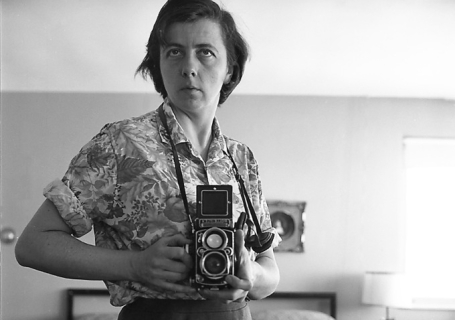 To kick off our Women’s History Month retrospective is Vivian Maier, a private, mysterious, and eccentric nanny who doubled as one of the most prolific photographers never known.
To kick off our Women’s History Month retrospective is Vivian Maier, a private, mysterious, and eccentric nanny who doubled as one of the most prolific photographers never known.
The Oscar-nominated documentary Finding Vivian Maier is about the woman who took over 150,000 photographs without telling anyone about her secret passion. Kids she nannied remember having off-the-wall adventures with her, and that she always had a Rolleiflex around her neck, constantly snapping away—but no one ever saw her prints.
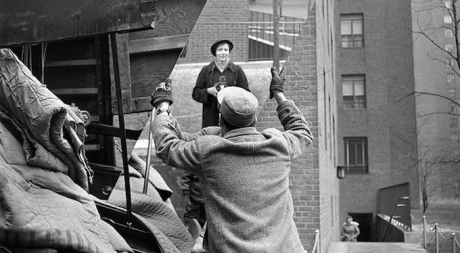 It wasn’t until 2007 when John Maloof purchased a huge box of negatives at an auction for a personal project. What Maloof discovered were the photos of now one of the 20th century’s greatest photographers. Maloof quickly decided to purchase all of her prints and negatives he could (some were hidden in storage lockers and not discovered until decades later). From there Maloof put together the first art show for Vivian in Chicago.
It wasn’t until 2007 when John Maloof purchased a huge box of negatives at an auction for a personal project. What Maloof discovered were the photos of now one of the 20th century’s greatest photographers. Maloof quickly decided to purchase all of her prints and negatives he could (some were hidden in storage lockers and not discovered until decades later). From there Maloof put together the first art show for Vivian in Chicago.
The documentary, directed by John Maloof and Charlie Siskel, uncovers Maier’s mysterious life through her passion for photography. A woman no one is really ever knew is brought into the spotlight through her never before seen photographs and films as well as interviews with dozens of employers and neighbors who thought they knew her—but really didn’t.
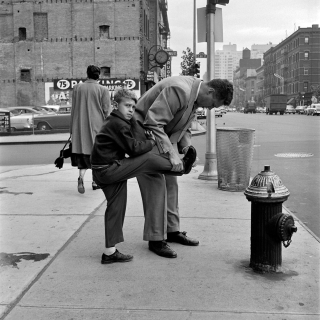
Currently, Vivian Maier’s body of work is being archived, cataloged, and on display at exhibitions around the world. Maloof is still reconstructing the Vivian Maier archive, with roughly 90% of her archive reconstructed. Though there is currently much controversy surrounding the rights to Maier’s work, her talent speaks for itself.
The re-discovery of Vivian Maier and uncovering her photography shows a side of what some would deem an underwhelming nanny in overwhelming times. But one look at her photos and you find the remarkable, amazing brilliance of a woman shining through the other side of her camera. VivianMaier.com

